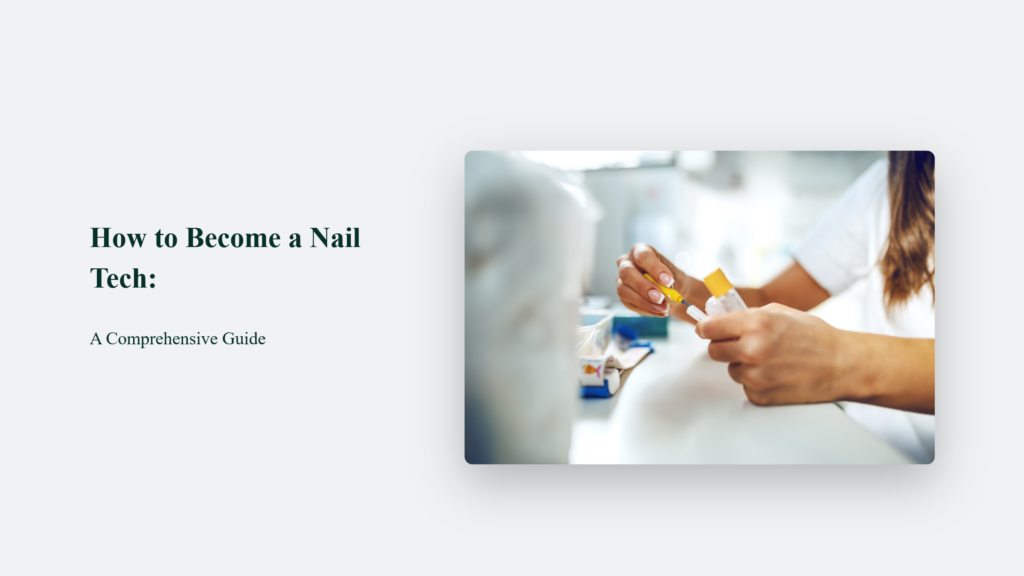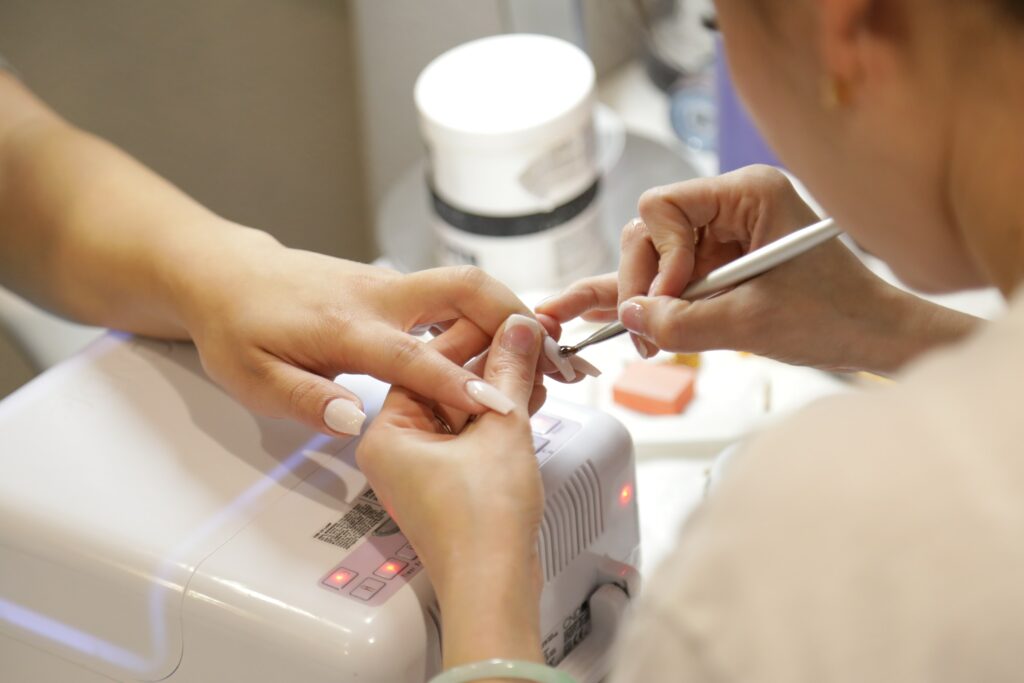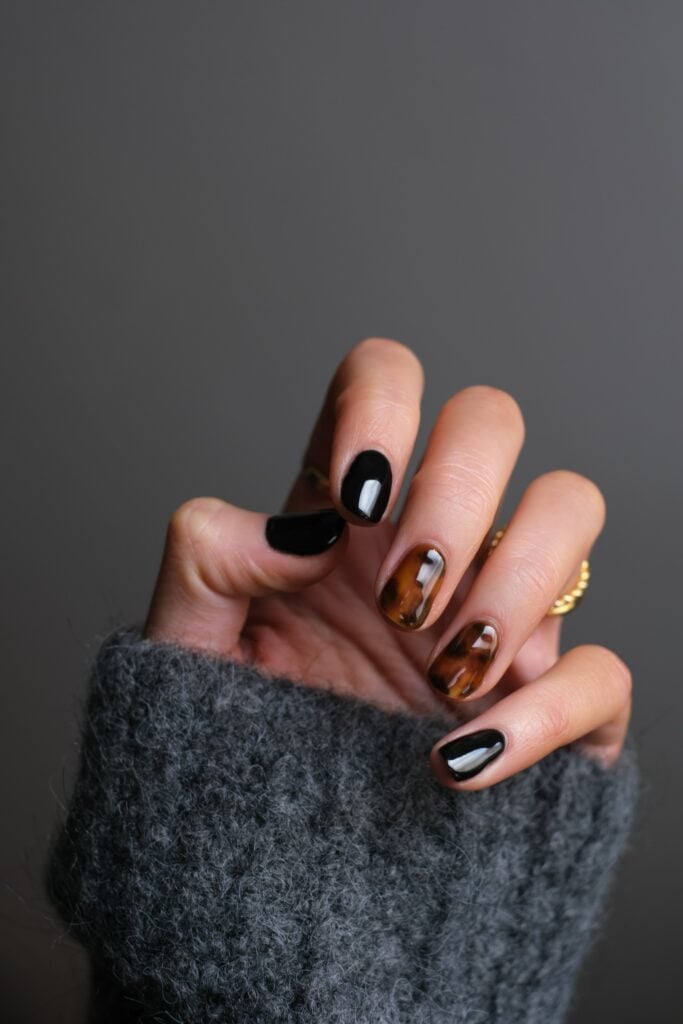The journey to becoming a nail technician is as colourful and diverse as the nail art you aspire to create. With a projected 22% growth rate by 2031, the nail industry is booming, offering a canvas for the artistic, detail-oriented, and sociable. This guide will take you through the steps to turn your passion for beauty into a rewarding career. So, let’s find out how to become a nail tech!

What does a Nail Tech Do?
A nail technician often referred to as a nail tech, specializes in the care and beautification of nails, including hands and feet. The role of a nail tech involves a variety of duties and responsibilities:
Manicures and Pedicures:
It is the fundamental service provided by nail techs. It involves caring for a client’s fingernails and toenails, including trimming, shaping, buffing, and cuticle care. Pedicures also focus on foot care, including callus removal and scrubs.
Nail Extensions and Overlays:
Nail techs often use various techniques to lengthen the nails. They might apply artificial nail extensions or overlays like hard gel, acrylic, or dip powder.
Nail Art:
Many nail technicians are skilled in creating detailed and artistic nail designs, ranging from simple patterns to intricate artwork.
Massage Services:
As part of their service, especially during manicures and pedicures, nail techs often provide hand and foot massages.
Client Education:
An important aspect of a nail tech’s job is educating clients on nail care and maintenance between appointments, ensuring the health and longevity of their nails.
Sanitation and Sterilization:
Nail techs are responsible for maintaining a hygienic work environment. It includes sterilizing tools and ensuring that the salon meets health and safety standards.
Nail Health Knowledge:
They are knowledgeable about nail health, including the anatomy of the nail, common disorders, and the best practices for maintaining nail health and appearance.
Product Knowledge and Sales:
Nail techs often advise clients on nail care products and may sell them as part of their services.
Staying Updated with Trends:
Nail techs must stay updated with the latest trends and techniques in nail art and care to offer the most current services to their clients.
Customer Service and Communication:
Good communication skills are essential, as nail techs interact directly with clients, understand their preferences, and often build a regular clientele.
Time Management:
Managing appointment schedules efficiently to ensure timely service and client satisfaction is another important aspect of the job
How to Become a Nail Tech:

Understanding the Role:
A nail technician is a licensed professional skilled in manicures, pedicures, nail extensions, nail art, and more, focusing on aesthetics and nail health. They are critical in client education and maintaining a clean work environment.
Meeting the Prerequisites:
Typically, you must be 18 years old with a high school diploma or equivalent, but requirements vary by state. Check your state’s licensing board for specific prerequisites.
Choosing the Right Program:
Nail technician programs differ from cosmetology programs, focusing solely on nails. These programs cover areas like anatomy, chemical products, hygiene, nail technology, and more. You’ll also learn practical skills like sculptures, overlays, and nail art.
Training Hours: The Path to Expertise:
States have varying requirements for training hours. For instance, New York requires 250 hours, while Arizona needs 600. This mix of theory and practice is crucial for hands-on experience.
Passing the Exams:
You’ll face both written and practical exams. The practical exams may include demonstrating skills like nail tip application and manicure application. Once you pass, you can apply for licensure.
Specialise and Shine:
As a nail technician, you have a plethora of career options. You could work in a salon, start your own business, or even become a social media personality, sharing your nail art with the world. The sky’s the limit.
Continuing Education: Stay on Top of Trends:
Continuing education is key to maintaining your license and staying updated on the latest nail trends and techniques.
Internships: A Step Towards Mastery
Internships are invaluable for aspiring nail technicians, offering a unique blend of real-world experience, skill enhancement, and professional networking. Here’s a comprehensive overview of the internship opportunities available in the nail industry:
Salons and Spas:
Many salons and spas provide internship programs where you can work alongside experienced professionals. This hands-on experience in a professional setting is crucial for learning different nail techniques and understanding the day-to-day operations of a salon.
Beauty Schools:
Certain beauty schools or vocational training institutes may offer internship placements to their students. These opportunities often include additional training and allow you to work with real clients under supervision.
Nail Product Companies:
Interning with companies that manufacture and sell nail products can give you valuable insights into product development and marketing.
Fashion Shows and Events:
Interning at fashion shows or beauty events allows you to work on models’ nails for photo shoots, runway shows, or promotional events, showcasing your skills and creativity.
Editorial and Media:
Magazines, beauty blogs, and other media outlets sometimes offer internships, providing exposure to editorial nail art and collaboration with stylists and photographers.
Nail Art Studios:
Specialized nail art studios offer intern positions where you can learn unique and creative techniques from expert nail artists.
Bridal and Events:
Working with wedding planners or event companies, you may find opportunities to provide manicure and pedicure services for bridal parties and special events.
When searching for these internships, contacting local beauty establishments, nail salons, and spas is essential. Additionally, online job boards, social media groups, and beauty-related websites are good resources for finding internship postings. Highlighting your skills, passion for nails, and eagerness to learn will be key when applying for these opportunities.
As a nail technician intern, you will develop various skills crucial for your career. These include manicures and pedicures, nail polish application, nail art, nail extensions, nail health and sanitation, understanding nail anatomy and disorders, client communication, sales and retail skills, time management, and nail product knowledge.
The experiences and skills gained from internships bolster your resume and provide a significant stepping stone in your career as a nail technician.
Beyond the Polish: The Business Side:
When venturing into the nail salon business, understanding and managing the business and insurance aspects are critical. Here’s a breakdown of the key components:
Business Structure:
First, choose the right business structure for your nail salon. Options include a sole proprietorship, corporation, limited liability company (LLC), or partnership. Each structure offers different benefits in terms of liability protection and tax implications. For instance, a sole proprietorship is simple but offers less personal liability protection than an LLC or corporation.
General Business Licenses:
You must acquire general business licenses to operate legally. It involves registering your business with the appropriate state authorities and applying for a Federal Employment Identification Number (EIN). The cost and specific requirements for business licenses can vary depending on your location, with fees ranging from about $50 to $400 and sometimes additional processing fees.
Insurance Needs:
Insurance protects your business from various risks, including customer and employee injuries, property damage, and legal liabilities. Essential insurance types for a nail salon include:
- General Liability Insurance: This covers accidents that result in customer injuries or damage to their property. For example, this insurance would cover the associated costs if a client slips and falls in your salon.
- Professional Liability Insurance: Also known as errors and omissions insurance, this protects against lawsuits claiming harm due to mistakes made during services.
- Workers’ Compensation Insurance: This is generally a legal requirement and covers your employees in case of work-related injuries or illnesses.
- Property Insurance: Necessary if you own the salon building, protecting against damages from fires or floods.
- Business Interruption Insurance: Helps recoup lost revenue if your business temporarily closes due to unexpected circumstances.
Insurance Policy Limits:
The limits of your insurance policies should be carefully considered based on the size and scope of your business. For general liability, the coverage could start at $300,000 and go up to $1 million, while building insurance can also be adjusted based on your needs.
Inspection and Compliance:
Post-establishment, your salon will undergo routine inspections to comply with health and safety guidelines. Be prepared for these inspections by maintaining cleanliness, having chemical safety data sheets, and training staff in health and safety protocols.
Additional Considerations:
If you rent a space for your salon, landlords often require proof of insurance. Also, if your salon offers additional beauty services like hairdressing, you might need extra licenses and insurance coverage.
Frequently Asked Questions:
How long does it take to become a nail technician?
It varies by state and program, but many can be completed in three to nine months.
Can I specialize in certain nail techniques?
In the End:
Becoming a nail technician involves creativity, learning, and dedication. It’s a path that allows you to beautify the world one nail at a time and offers a platform for endless personal and professional growth. Dive into this vibrant industry and let your passion for nail art shine!




